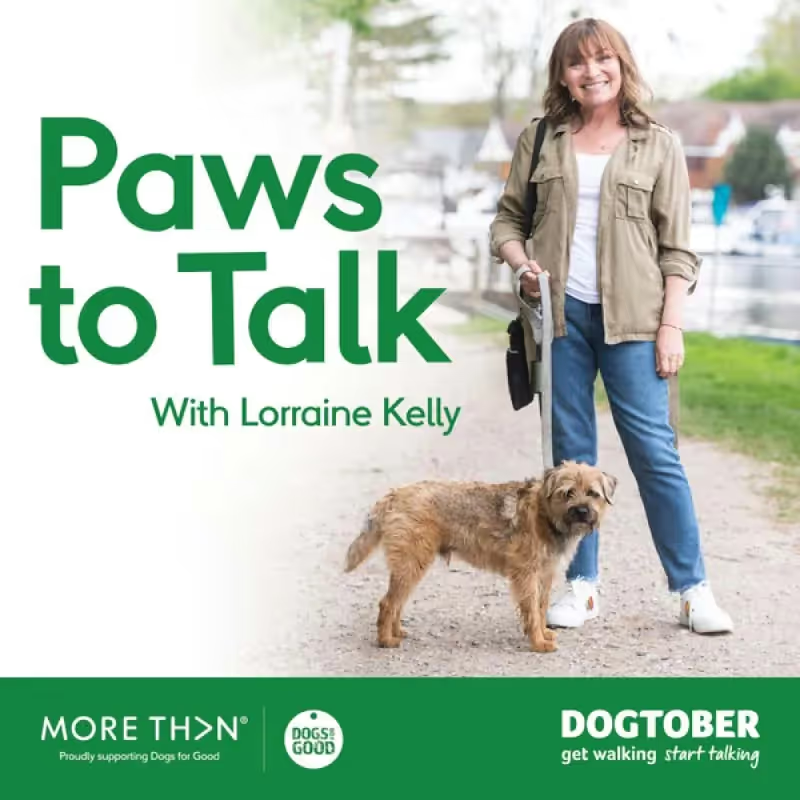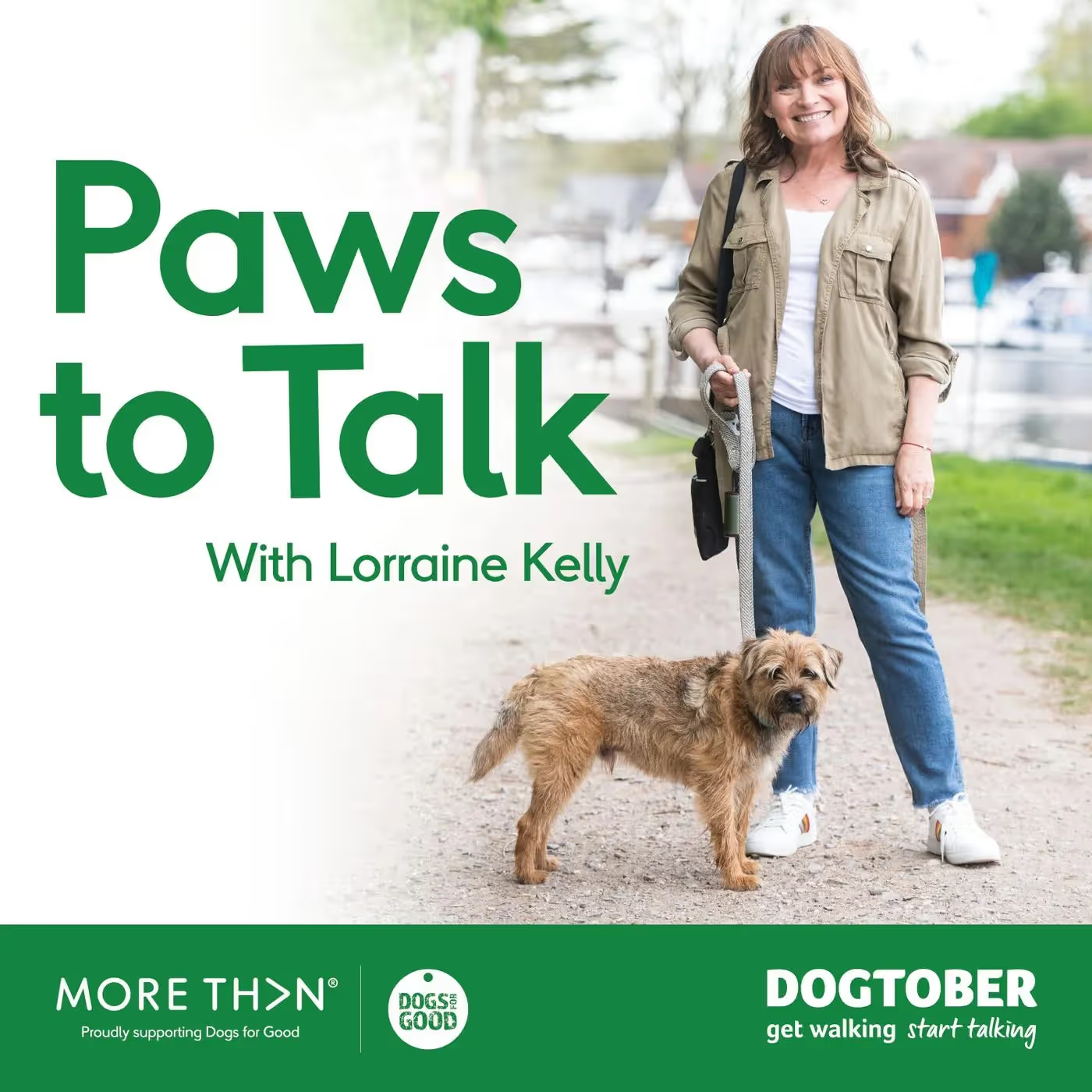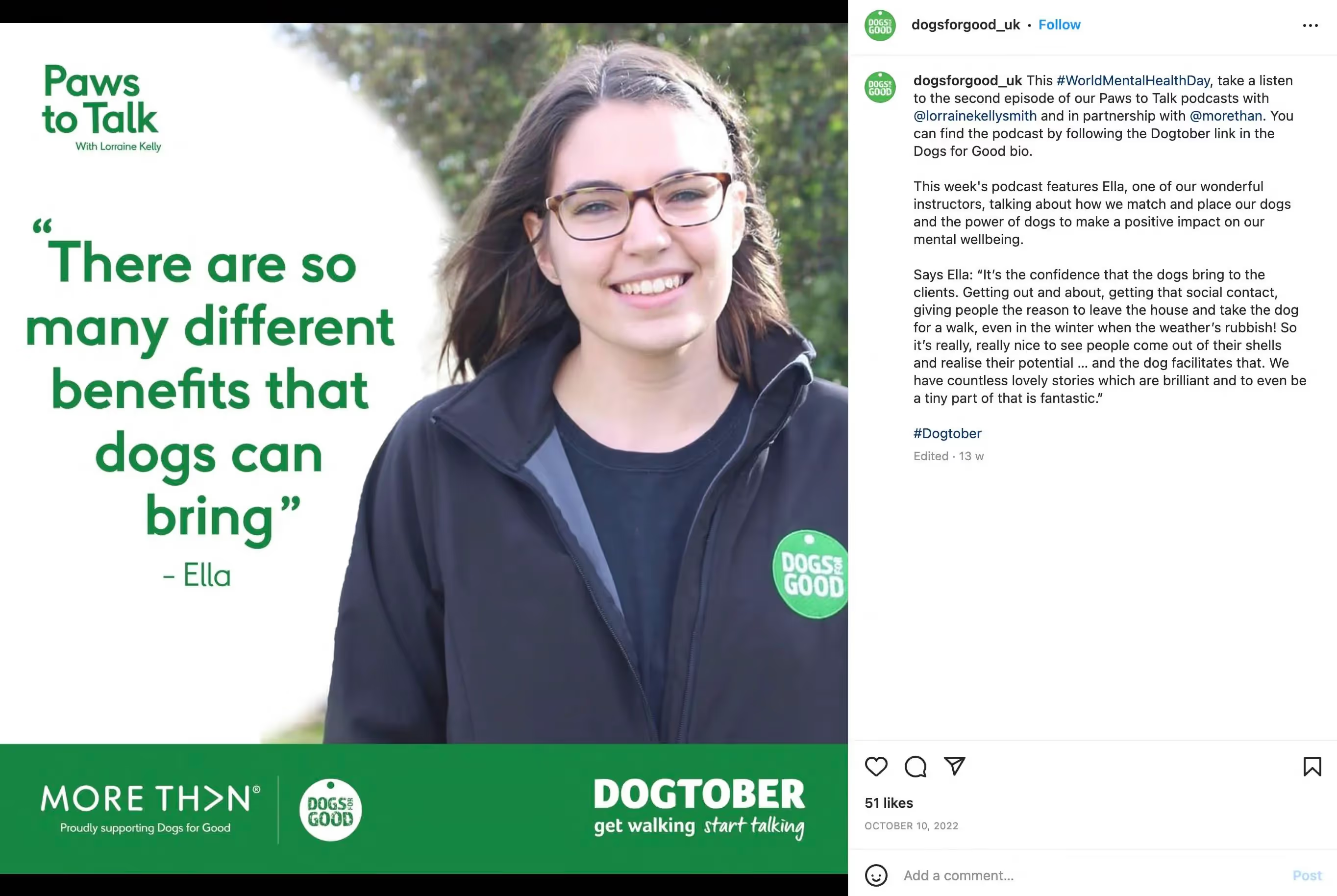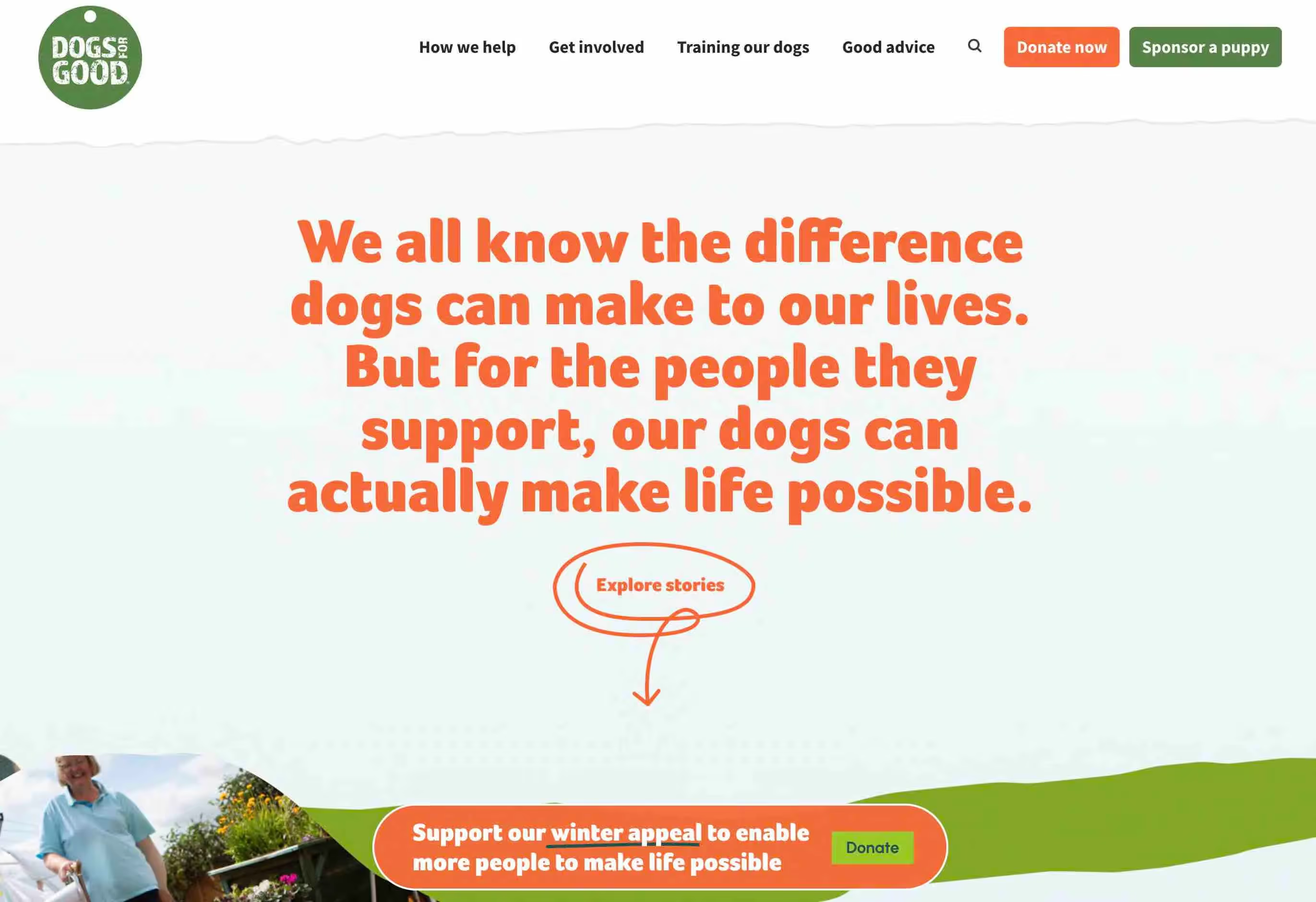
Let's Talk
Menu



To create a social impact in today’s world, you need people to care about your cause. But first, you need to get them to hear you. And that’s where podcasts come in.
Not only are podcasts more intimate than leaflets and white papers, but they also make exploring complex topics much more digestible. They’re a great platform for raising awareness, and have mass appeal to all kinds of audiences. Plus they’re convenient, engaging, and incredibly accessible.
We’ll go into the benefits of podcasting for nonprofits shortly. Before we do that though, let us introduce a client who we recently worked with to produce a podcast driving one of their 2022 nonprofit campaigns.

Dogs for Good is a UK-based charity dedicated to training service dogs. A mission not only bringing dogs and people together, but also helping adults and children lead more independent lives. Either at home, or in the community around them.
And every October, they run a month-long fundraising campaign called ‘Dogtober’, which aims to shine a spotlight on our canine friends. 2022 was slightly different to previous years, though. Because they partnered with Cue Podcasts to fully plan, produce, and distribute a 3-episode podcast special. We’ll give you a quick run down of the project below.
Hosted by Lorraine Kelly (UK journalist and TV presenter), Paws to Talk shares inspiring, first-hand stories from the very people supported by the charity. Episodes not only celebrate the special relationships dogs help us make, but they also examine the life-long impact of service dogs around the country.

Click the audio player at the top of the page to listen to the podcast.
Note: We’ll be referencing Paws to Talk throughout the following article. The aim is to use first-hand examples demonstrating how nonprofits can use podcasting in campaigns.
Starting a podcast for your organisation can result in various pay-offs. Yes, it can take a lot of time and effort to do, especially if you have no idea where to start. But you get out what you put in, as they say. Here are the 10 main benefits of podcasting for nonprofits.
To effectively raise awareness about a topic, you need to make it as easy as possible for audiences to engage with. A podcast can help with that, because they’re effortless to listen to, easy to find, and great for taking on-the-go. They don’t demand sit-down viewing time.
Audiences can be out walking the dog, running errands, or simply on the morning commute. There’s next to no effort in listening to an episode of a podcast, and once downloaded, it can be replayed at any time. This increases listener retention. Plus, anyone who subscribes to your podcast will get the latest episodes automatically downloaded onto their device.
Podcasts are educational tools. In fact, 75% of podcast listeners use them to learn new information, get clued up on various topics, or seek specific insight or opinion. Don’t miss out on this. A nonprofit podcast is the perfect place to teach audiences about your charity and message. What’s your cause? What do you stand for? What are you fighting for? Why?
Whether your podcast’s aim is to educate, inform, or entertain, shows that typically give listeners value are the best ones. Providing listeners with actionable advice keeps them coming back. Good nonprofit podcasts signpost people towards free tools, real-world examples, and other sources of insightful information. We’d strongly recommend adding any relevant links into the show notes for each of your episodes.

This one’s simple, but important. Starting a podcast for your nonprofit gives you a platform to connect with existing audiences on a deeper level, resulting in stronger connections. And the more engaged the community, the better. That being said, building a dedicated audience doesn’t happen by magic. You need to put in the work. This could look like asking your supporters for feedback, replying to comments, creating a newsletter, hosting live events, or just posting behind-the-scenes content.

Because podcasts are so accessible, reaching a wider pool of potential supporters is easy. The pure nature of podcasting means listeners can tune into your show from anywhere around the world, making them the perfect tool for reaching new audiences. Once you’ve uploaded your audio and pushed it live, there are few geographical limits on where it can be listened to.
Note: Dogs for Good's Paws to Talk received 3.5k+ downloads worldwide during the October campaign.
Podcasting for nonprofits is an opportunity to remind audiences of your charity’s name, what it stands for, and what you’re advocating for. Even including your logo in your podcast artwork, for example, will act as a subtle nod to your cause. As will a short and snappy brand pitch in your episodes’ intros and outros.
Small touches aside. Podcasts give you the opportunity to raise brand awareness, tell your story, and create an impact. They’re also a powerful way of getting your message heard by millions of people. Creating transparency about the origins of your organisation, and the values it stands for can be really beneficial when it comes to building a dedicated community. If listeners genuinely feel like they know who you are as a brand, they’ll be more willing to support you.
When introducing the first episode of Paws to Talk, Lorraine makes sure to state the charity's name, and the podcast's goal. She says:
I’m Lorraine Kelly, and I’ve teamed up with Dogs for Good. We’ll be sharing stories over the course of October, or as we’ve retitled it, Dogtober. The aim is to encourage the British public to walk 100km by the end of the month, and raise funds for the charity.
We know statistically that the majority of podcast listeners are fairly young. In fact, Edison Research reports in their 2022 Infinite Dial study that 47% of U.S. podcast listeners are aged 12-34 (shown below), a group consisting of Millennials and Gen Z.

Now, diving into a study of Millennial and Gen Z behavioural patterns is beyond the scope of this article. That being said, we know they’re typically strong advocates for diversity, and are digitally minded and politically progressive. It goes without saying then that nonprofits (particularly long-running ones) need to stay on top of generational trends to stay relevant and appealing. And because we know these two generations favour online audio, using podcasts to connect shouldn’t be overlooked.
Global media company, Forbes, also reports that:
“Millennials (and Gen Z) are more likely to give to charity than other generations. In a recent study, 84% of millennial employees gave to charity, and 70% of them donated more than an hour to a charitable cause.”
Podcasting is now one of the most accessible ways to become a thought leader.
In the past, you had to get on TV or publish a book to be considered a true thought leader. Meaning traditional media gatekeepers had all the power - they decided who was an expert, and who wasn’t. But things have changed. The internet and new media shifted the balance of power.
To put it bluntly, people won’t donate to a cause they’re not confident in. Or, an organisation they don’t know much about. They will donate to one they trust and respect, on the other hand. One they see as authoritative. A well-produced, informative podcast featuring high-quality, expert guests can help you build this credibility.
The financial reward from podcasting for nonprofits can be worthwhile. If you produce good content and put the work in, you might be able to find sponsors or people willing to donate to your organisation. This is a good way of monetising your show and raising funds. Getting your podcast to this point takes a lot of work though, so try not to be disheartened if you don’t see any immediate financial reward.

If fundraising is your ultimate goal, a podcast would also give you the option of creating subscriber-only, premium content and placing it behind a paywall. This might include:
It’s important to note that this will only work for well-known causes with large audiences. If the demand is there, subscriber-only content makes sense. If you’re a new or small charity on the other hand, you’re probably not ready to start charging for additional content.
Repurposing podcast episodes into other formats is crucial for driving engagement. Not only that, but doing so means you can share your message on multiple platforms. Plus, it’s always good to flesh out your content strategy and get maximum mileage out of every episode you release. To give you an idea, you’ll be able to convert episodes into some of the formats below:

Amy Woods (founder of Content10x) recently spoke to us over at Podcast.co regarding the effectiveness of content repurposing. She said:
“If you can repurpose your audio content to start conversations on social media, you’ll fuel engagement on each platform. And it could actually account for a post a day. It doesn’t take that much extra time or brain effort to do, because you’ve already done the hard work making the episode.”
A brand with a good SEO presence will perform much better than one without. So building and maintaining your podcast SEO is important. And by that, we mean having an attractive and informative website that you can drive traffic to. It’s here that you can create a resource hub for all your episode show notes, transcriptions, charity information, social links, and anything else you deem relevant. You'll then be able to direct listeners to it in your episodes, increasing overall traffic. The more people you can get there, the better your reach will be.

Note: An in-depth explanation of SEO is beyond the scope of this article. But if you’d like to learn more about it, check out this article from Moz.
Podcasts are the perfect tool to help you raise awareness, create real social change, and engage people for substantial periods of time. We hope that came across in the above article, and we hope the integrated case study helped you decide if a podcast is the right next step for your organisation.
If you'd like to hear how the team at Cue can help your organisation start a podcast, click here.



Join our carefully curated newsletter packed with insights, tips and resources to help shape and share your stories.